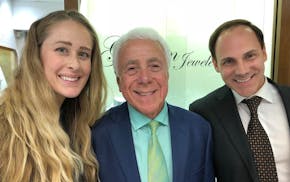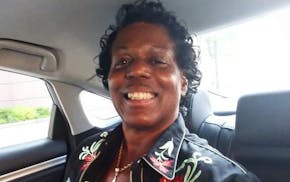Some visitors to the downtown Minneapolis Hilton should leave feeling happier than when they arrived March 24 — for reasons that have nothing to do with duplicity.
Dr. Verna will be there talking about "Finding the Happy Factor at Work." An internationally known human potential expert and CEO of The Power of People Consulting Group, Verna Cornelia Price founded the "change conference" six years ago.
"I have had too many people come to me for coaching who are so unhappy in their jobs. There's something going on in the workplace," she said. "The bottom line is it is hurting people. People are getting sicker by the minute. There's absenteeism in the workplace. And these are people who are smart, used to be energetic and fun. The whole day is about how you get re-energized and how to find that place of happiness for yourself in your workplace. We'll do everything from painting to tai-chi to learning about leadership; how to rebrand yourself in your profession. All sorts of stuff."
The author of three books, including, "The Power of People: Four Kinds of People Who Can Change Your Life," Dr. Verna is also founder of three programs designed to help teens and adults use their personal power. There's Girls in Action, which is in seven Twin Cities schools. "Then there's Boys of Hope, the newest program. It's like Girls in Action. I work on it with my husband [Shane Price], who also runs a 'Re-Planting Program' for offenders. I've created a curriculum he teaches in prisons, using my books. Then when they are released, they work with the Power of People Institute about finding jobs, keeping relationships together."
She is expanding her repertoire, working with the St. Paul Police Department to improve perceptions between youth and police.
A motivational speaker — the hat she wears that helps pay the bills for her family of four kids — Dr. Verna has been featured in magazines from Ebony, which named her an Everyday Hero in 2013, to Minnesota Business. The Ohio native has done well in Minnesota, despite her arrival. She was dropped off at Crown College, which her parents selected without mentioning that they had no funds to help with her education. She earned a Ph.D. in educational policy and administration from the U and is currently on the Leadership Institute Faculty at St. Catherine University.
Armed with a beautiful smile and a winning style, Dr. Verna is relentlessly upbeat but not in that annoying way.
Still, she must have down times, right? "No," she said.
You never get sad? "I don't. I don't," she said. "I have many reasons for that but that's a whole other conversation, off camera."
I mainly wanted startribune.com/video of Dr. Verna talking about the E! TV "Fashion Police" writer who wrote apology-inducing wisecracks for Giuliana Rancic to say about Disney star Zendaya's dreadlocks. I got roped into way more, including a speaking engagement, by the persuasive, talkative Dr. Verna, who aims to someday share territory with Dr. Phil and Iyanla Vanzant.
"You have to help me," said Dr. Verna. "I don't have the Oprah connection."
Q: The premise of your book "The Power of People" is that personalities fall under one of four types?
A: Yes. First of all, people are powerful, so the whole notion is that you are born with power. You're not just existing, you're walking around loaded with power. You can use your power in one of four ways. You can use your power to be an Adder, a Subtracter, a Multiplier or a Divider. Here's the thing that gets me: Who teaches you that you're powerful? Let's start there. Which mom or dad says, "You are powerful. Go for it. Just make it happen." Not only that, but who teaches you how to use that power, to be an Adder or a Subtracter? In this work what you find is that people don't even know who they are, much less how they're using their power.
Adders are people who believe in you, no strings attached. That's key. They see your potential and bring added value to your life. Sometimes people mistake those people for people who are trying to get on your case.
Subtracters are people who've been socialized for the most part to just take things from you. They take anything, an-y-thing. First of all they take your energy. You go to work and take one look at them and you just know they are coming after your energy. And what can you do without energy? On the extreme end they are needy people, they create drama for you. And they don't want you to solve the drama. They just want you to be in the drama with them. The best thing about them is that most of them are clueless.
A Divider, the most dangerous of the four types of people, is strategic about destroying. They pretend to be your very best friend. And they get to be your best friend fast. They get all your information. They use that information to manipulate you, then they start trying to control you. If they can't they'll turn on you and destroy you anyway. If you think you have a Divider, I'd say just run away from those people. Get awwwwaaay. Change jobs. Move to a different town. [Laughter]
Then there are Multipliers. These extraordinary people don't need anything from you. They already have the notoriety, the fame, the wealth, the position. They see a rising star. She's trying to do something good. They keep an eye on you and say, 'I am going to help her.' A Multiplier will say, "You know what, C.J., what would you like your next project to be?" You'll tell them and they say, "I can work that." They just want to take you to the top.
Q: I'm not seeing a lot of difference between the Adder and Multiplier.
A: Multipliers make your dreams and vision a reality almost instantly. Who would Dr. Phil be without Oprah?
Q: What's the first one of these personality types you noticed in your family of origin?
A: Oh, that's a great question. Adders, and I'm thankful for that because after I got through with Adders, the Subtracters showed up [raucous laughter]. Right? And then a Divider showed up and I was so thankful that my foundation was Adders. My grandmother was just an amazing, extraordinary woman who taught me how to love people, to serve people, do my best for people. Had I started being socialized with a Subtracter, I would be a mess. I would do some damage. [Laughter]. It's true. Which is why I am very forgiving of people. I've learned not to judge.
Q: Why is mainstream media having such trouble with the hair of ethnic women?
A: That's a good question. I have twiggles, they are double twisted. I can untwist them anytime I want; I have had natural hair for 15 years. It's so interesting, everywhere where I go. I was just in China not very long ago, and they were so interested in my hair. Fascinated. Now here's the reality. Women of color, as a rule, are beautiful. [Pause.] This is true. We tend to be beautiful, energetic, big smiles, lovely. Some people have a real hard time with that. Now we can talk about the underlying issues that are driving that. Things like the fact that our country is steeped in racism. Things like we have been socialized as a people to be racist. Things like that residue of racism still leaves your average Caucasian person feeling as though they are better than the typical person of color. They feel they can't be outdone or affronted in any way by a person of color because in their wiring, their socialization, they feel as though they are better. It's a real issue in our country.
Q: Where the Chinese are concerned, you can kind of forgive them. They may not see a lot of people who look like us.
A: That's true. They are curious. Very curious. But you have to love that. I would take curiosity over stereotypes that are socialized, discrimination that is socialized. In my work "work," I call it trying to rewire your brain but it's also going into your socialization patterns and saying, "What were you taught? What did your Momma say seen she saw So-in-So, who happened to be African-American, happened to have dreadlocks or natural twist? What did she call her when you were three years old?" As grown-ups we don't want to deal with that hard kind of wiring that's in us, but we have to do it. And we certainly can't just show up talking about hair on a main stage and making terrible comments.
Q: Are you working with other police departments in addition to St. Paul's?
A: We are working on working with them. Just came back from Houston [Texas]. Also working with the city of St. Paul and the assistant chief there, Todd Axtell and director of Department of Human Rights & Equal Economic Opportunity, Jessi Kingston. The whole idea is given all of what's happened as related to our young [black] boys — police brutality, guns, weapons, shooting, innocent deaths — they approached me and said we need to bring young people and police together, so we can get ahead of some of this stuff. The conversation is how to bring both of those very different [groups together]; human beings to the table to create community.
Q: Is it more work to get the police to see the kids' perspective or the kids to see the police officer's point of view?
A: It's both. It's almost right down the middle. When you sit around a table with them you can see them trying to figure each other out and figure out how to be together and create community. How can you get to know each other before an emergency situation.
Q: There is a mentality with police that seems to be in play because the same kind of bad encounters happen in black communities where the police force is also mostly black?
A: Right. But you have to understand the training they go through. There is a premise for the training of authority and you having authority and it's paramilitary. Here's what I would like to do. I'd like to be able to train them up front with diversity/racism training so we can go after some of that stuff before they get the uniform on and get on the streets. They can at least have a second thought before they do something crazy.
Q: A lot of people who want to become police are, in my observation, not really comfortable with authority.
A: Hummm. That's really interesting.
Q: You have to be comfortable with your power.
A: You do. My goal is to have police officers use all that power ********** They get both [kinds of] power: positional power and personal power. Put them together. So how can you be an Adder*******. That's what you are supposed to be, serving our community. Protect and serve. So how do you do that with intention? What else can you do [that's not deadly]?
Q: What's the first thing you'd do with that Ferguson Police Department as a result of the Justice Department report that shows what a racist force that is?
A: [Laughter] I would sit down and teach them. It's like A, B, Cs. If you never learned you don't know how to read. If you don't you're just going to continue doing whatever you were taught. If you were taught to be racist, guess what you're going to do on that police force? I would step back and say, "Let's teach you. After I've taught you I'm going to hold you absolutely accountable."
Q: What happens to the self-esteem of young black girls when they hear writers for "Fashion Police" composing lines for Giuliana Rancic about Zendaya's hair smelling like patchouli oil?
A: Comments like [those on "Fashion Police"] are telling our girls it's not OK to be your authentic self. The fact is, that is the conversation our girls need to have, to be able to say, "It's OK for me to have natural hair." When you have to do your dreads or twisties, you use natural products. And as anyone who has done their research will know, all natural products have nice high scent. Most of the things we are smelling have been so toned down but are really pure scents; the Aveda people figured it out. Walk into an Aveda, you know what you smell: high scent flowers. Why? Because that's what's needed to keep your hair natural and beautiful.
Q: One magazine compared Solange Knowles' hair to a poodle. And Rancic derided Zendaya's hair but in another episode of "Fashion Police" reportedly found dreads on one of Bruce Jenner's children groundbreaking.
A: It's a lot of work. I just look at them and think, "You're a white person, that doesn't quite work for you." Let's make it clear here. No one naturally dreads their hair. To dread your hair takes a lot of work. It's a commitment. This is what we tell the Girls [In Action]: Don't make the assumption that just because someone's on television or has a name that they are actually knowledgeable and informed.
Q: What did you think of Bill Cosby saying the black media should remain silent in the midst of these allegations against him?
A: Any media source that's serious, if you're going to do a story just make sure you get the facts, do your homework. I don't think any story should be off the table, for any reputable media organization. If it's a story, it's a story, whether it's Bill Cosby or Bill Clinton. In cases where there are people of color who are being put to the test, I think black media should speak up, say something if you think that's not right. It's important that we keep our voice in the media because if we don't somebody else is going to keep their voice in the media.
Q: What kind of people did Bobbi Kristina [daughter of Whitney Houston and Bobby Brown) surround herself with before getting into her current life-threatening predicament?
A: Is she in a coma still? [Deep sigh] My heart just hurts, my heart just hurts for her. I believe that young lady was raised in a chronic Subtracter situation. What they suffer from the most is deep, deep psychological, emotional pain. Unless you have a direct intervention for that, you continue that same pattern of losing your power.
Q: Do you attract these people?
A: You do. Anytime in my executive coaching, somebody comes to me complaining about what's gong on in their life, I always do a power assessment with them because what you are doing is attracting people.
Interviews are edited. The reach C.J. try cj@startribune.com and to see her on TV check out the FOX 9 Buzz.

C.J.: Jerry O'Connell gets support from Wendy Williams for talk show



